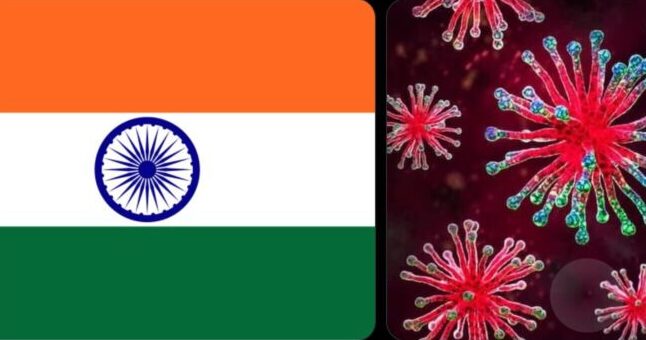India reports first 2025 case of Human Metapneumovirus (HMPV), 8-month-old baby tests positive in Bangalore
India after China has now confirmed its first case of Human Metapneumovirus (HMPV) for 2025, a concerning development as the virus is known to cause respiratory illnesses, particularly among infants, young children, and the elderly. An 8-month-old baby from Bangalore has tested positive for the virus, prompting health authorities to monitor the situation closely and take preventive measures.
This marks the first reported case of HMPV in India for the year 2025, raising concerns within the medical community and highlighting the need for heightened vigilance against respiratory infections as the country navigates the ongoing health challenges.
What is Human Metapneumovirus (HMPV)?
Human Metapneumovirus (HMPV) is a type of respiratory virus that can lead to a range of symptoms, from mild cold-like signs to severe respiratory distress. It is part of the paramyxovirus family, which also includes the respiratory syncytial virus (RSV), known for causing bronchiolitis and pneumonia in infants.
HMPV primarily affects the upper and lower respiratory tracts, and it can cause conditions like pneumonia, bronchiolitis, and croup. The symptoms of HMPV infection can resemble those of the common cold or flu, including cough, fever, runny nose, and wheezing. In more severe cases, it can lead to difficulty breathing, hospitalization, or even death, particularly in vulnerable populations such as infants, elderly individuals, and those with weakened immune systems.
The Case in Bangalore
The baby, an 8-month-old from Bangalore, was reportedly admitted to a local hospital after showing symptoms of respiratory distress. Upon conducting tests, doctors confirmed the presence of HMPV. Health officials have initiated contact tracing and are advising parents to be aware of respiratory symptoms, especially in infants.
The baby’s condition was described as stable, and the family is currently under medical supervision. Hospital staff has been closely monitoring the situation to ensure the safety and well-being of the child, while also taking precautionary steps to avoid any further spread of the virus.
Health authorities in Bangalore have assured the public that there is no immediate cause for widespread concern, but they emphasized the importance of early detection and medical intervention, particularly in the case of young children and those with underlying health conditions.
How HMPV Spreads
Like many respiratory viruses, HMPV spreads through respiratory droplets when an infected person coughs, sneezes, or talks. It can also spread through contact with contaminated surfaces. This makes it highly transmissible, especially in places like schools, daycare centers, and hospitals where young children and vulnerable individuals are present.
The virus can be particularly dangerous for young children, as their immune systems are still developing. Parents are urged to practice good hygiene, such as frequent handwashing, disinfecting surfaces, and avoiding close contact with infected individuals to reduce the risk of transmission.
Precautions and Prevention
As with most respiratory illnesses, prevention of HMPV relies heavily on good hygiene practices and awareness. Here are some preventive measures that can help reduce the spread of HMPV and other respiratory infections:
- Hand Hygiene: Washing hands regularly with soap and water for at least 20 seconds is one of the most effective ways to prevent the spread of respiratory viruses.
- Cover Coughs and Sneezes: Encouraging individuals, especially those with cold-like symptoms, to cover their mouths and noses with a tissue or the inside of their elbow can help prevent the spread of droplets.
- Avoid Close Contact: People showing symptoms of respiratory illness should avoid close contact with infants, the elderly, and those with compromised immune systems to reduce the risk of spreading HMPV.
- Disinfect Surfaces: Regularly cleaning and disinfecting commonly touched surfaces like doorknobs, remote controls, and toys can help prevent the transmission of the virus.
- Seek Medical Attention Early: If children, especially infants, show signs of respiratory distress, it is essential to seek medical help immediately. Early diagnosis and treatment can help prevent complications.
What Does This Mean for India’s Health System?
The confirmation of HMPV in India adds another layer of complexity to the country’s ongoing efforts to control respiratory infections, particularly following the COVID-19 pandemic. While HMPV is not a new virus, it is one that requires vigilance due to its potential for causing serious illness in vulnerable populations.
India’s healthcare system has already been under pressure due to the pandemic, and now, as other respiratory viruses like HMPV gain prominence, there is concern about the impact they could have on hospitals, particularly in urban centers like Bangalore.
The case in Bangalore underscores the need for continued investment in healthcare infrastructure and preparedness for emerging health threats. Authorities have called for increased surveillance and testing to track the spread of HMPV, as well as public health campaigns to inform the population about preventive measures.
Global Perspective on HMPV
Globally, HMPV is considered one of the significant causes of respiratory infections in young children. According to the Centers for Disease Control and Prevention (CDC), the virus typically circulates in the winter and early spring months, although outbreaks can occur year-round.
In the United States and Europe, HMPV infections are closely monitored, and health authorities provide seasonal warnings similar to those for influenza or RSV. Given India’s dense population and challenges in managing healthcare resources, this new case of HMPV serves as a reminder of the ongoing need for vigilance in managing respiratory illnesses.
In Conclusion
The first case of Human Metapneumovirus (HMPV) in India in 2025 has raised awareness about the importance of early detection and prevention of respiratory illnesses, particularly in vulnerable groups like infants. The case in Bangalore serves as a reminder of the ongoing need for good hygiene practices and early medical intervention.
While HMPV is not as widely known as some other respiratory viruses, its potential to cause severe illness in young children and the elderly makes it a serious concern. As India navigates this new case, public health officials are emphasizing the importance of preventive measures and encouraging parents to seek medical attention if they suspect their child may be infected.
As we continue to monitor the spread of HMPV in India, it is crucial to remain vigilant and proactive in safeguarding public health through education, hygiene practices, and timely medical care.

















Post Comment